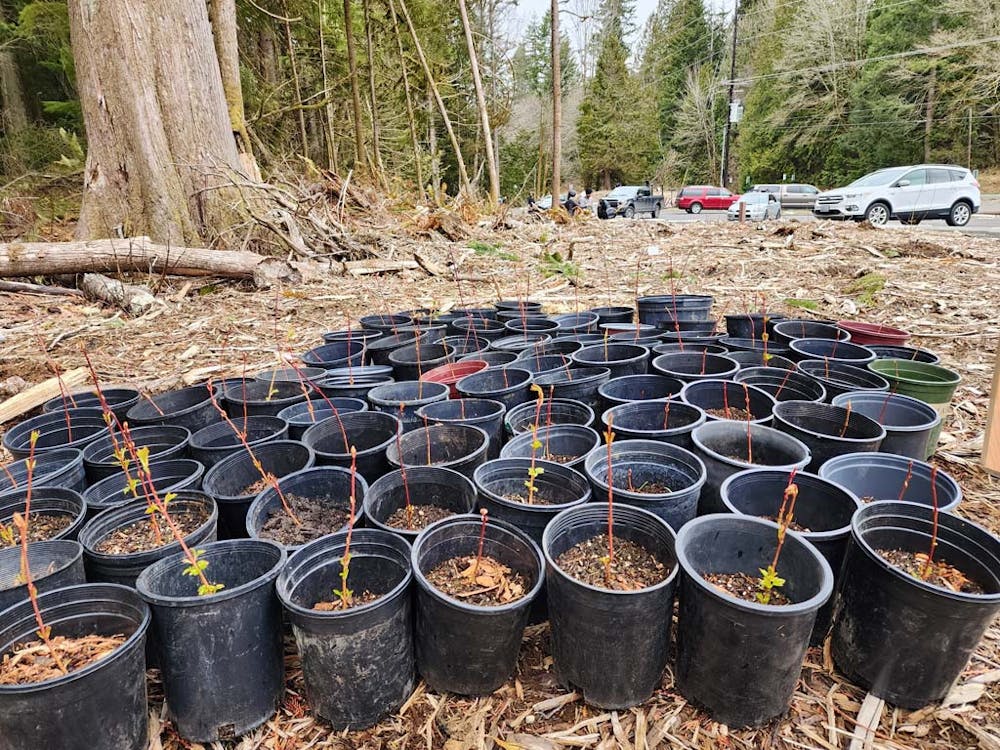In a joint effort to enhance local ecology and engage the community, the City of Bellingham’s Parks and Recreation Department alongside partners Washington Native Plant Society and Whatcom Million Trees Project has organized a native plant restoration and tree planting event at the Galbraith Trailhead on Saturday, Feb. 24, 2024.
The Whatcom Million Trees Project, initiated three years ago, has been working towards the goal of planting and protecting one million trees in Whatcom County. The project's multifaceted approach includes not only tree planting but also the protection of mature trees, recognizing the importance of preserving an existing ecosystem.
“Seedlings are great, but they take quite a long time to actually start having the carbon absorption benefits and other complex, mature forest ecosystem benefits,” said Mallorey Roe, volunteer coordinator and social media manager for the Whatcom Million Trees Project.
As part of its mission, the Whatcom Million Trees Project collaborates with various organizations and governmental bodies, advocating for the protection of legacy forests and coordinating efforts to ensure mature trees aren’t logged.
The initiative has expanded to include protected urban trees, removing invasive species like English ivy, and actively participating in the development of an Urban Forest Management Plan within the city.
The native plant restoration event on Feb. 24 aligns with the broader goals of the City of Bellingham and its Parks and Recreation Department. Remic Ensweiler, the City’s park stewardship supervisor, emphasized the City’s commitment to addressing climate change, enhancing resiliency and connecting citizens with natural spaces.
The event will take place at the Galbraith Trailhead at Lake Padden, a site where native plant restoration efforts have been ongoing.
“The goal is to have an autonomous, sustainable landscape whereby the invasive species are outcompeted by native species for the Galbraith Trailhead area,” Ensweiler said. “For the local parks, we want to help balance the interests of the community and the environment to provide the best service to the patrons of the City of Bellingham's Parks and Recreation Department.”
In addressing invasive species, the Parks and Recreation Department employs various methods, including cutting, digging, mulching and planting native species to overthrow the invasive plants. Beyond immediate removal efforts, the Whatcom Million Trees Project engages in ongoing advocacy, urging local politicians and governmental bodies to adopt policies that restrict the proliferation of invasive species.
The Whatcom Million Trees Project has recently announced a series of upcoming tree-planting work parties scheduled for March. With two confirmed events on March 10 and 23, volunteers will converge at the Whatcom Humane Society’s Wildlife Rehab Center. Those who wish to volunteer can sign up at the Whatcom Million Trees Project website.
“It helps people to realize that they actually can make a difference because they have this opportunity to visit natural areas very close to their community and really do things that make a difference,” Roe said, reflecting on the overall Whatcom Million Trees Project and past events.
Roe said that the amount of trees planted and protected is growing rapidly. These upcoming work parties provide an opportunity for individuals to contribute hands-on to the goals of planting and protecting a million trees in Whatcom County.
Ann Beard, a representative from the Colorado Native Plant Society, gave insight into the organization's crucial role in advocating for native plants. Beard emphasized the environmental benefits native plants provide, from building soil health to supporting diverse wildlife.
“The aim and goal of these organizations is to educate people and to advocate for native plants and habitats. Plants and wildlife are native to a particular region; they’ve grown together in a kind of symbiotic way,” said Beard. “Humans have disrupted this balance, and there's a huge environmental and social cost to that.”
Isabella Vandaveer (she/her) is a city life reporter for The Front. She is a junior majoring in visual journalism and newly minoring in film. Outside the newsroom, you can find her skiing at Baker, drawing, or taking a long walk around her neighborhood. You can reach her at isabella.thefront@gmail.com






